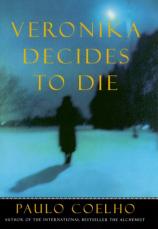Reading Group Guide
Discussion Questions
Veronika Decides to Die

1.Veronika claims to have chosen suicide in order to achieve "freedom at last. Eternal oblivion." What would make freedom and oblivion so appealing to a twenty-four-year-old woman? What is significant about the use of the word "decides" in the title?
2.Although Veronika's story takes place in the former Yugoslavia, are there any elements of the novel that are universal? To what extent is Veronika's situation a result of living in a country such as Slovenia‹a small country, that few people have heard of‹but that nonetheless has a significant, and recently violent, history?
3.Of the four patients at Vilette that we come to know ‹ Veronika, Zedka, Mari, and Eduard‹with whom, if any, do you identify, and why?
4.What has each of these characters learned during his or her time at Vilette? How do you think they will do in the "outside" world?
5.Veronika asks, "In a world where everyone struggles to survive whatever the cost, how could one judge those people who decide to die?" Do people have a right to approve or disapprove of suicide? Do we have a moral obligation to stop someone from trying to kill himself? Can the decision to commit suicide ever be considered rational?
6.How does Veronika react to Dr. Igor's news that she is suffering from a fatal heart disorder? Why would someone who wants to commit suicide be devastated by the thought of dying?
7.What do you think of Dr. Igor's theory about Vitriol, the name he gives to a "disease of the soul" that affects people who have grown embittered? Do you recognize evidence of Vitriol in people around you? Is the condition widespread?
8.How do you feel about Dr. Igor's experiment on Veronika? Was it morally justifiable?
9.On hearing the news that she is soon to be released from Vilette, Zedka reflects, "Once in a mental hospital, a person grows used to the freedom that exists in the world of madness and becomes addicted to it. You no longer have to take on responsibilities, to struggle to earn your daily bread, to be bothered with repetitive, mundane tasks." And yet, she wants to leave. What enables Zedka as well as Eduard, Mari, and Veronika to decide that they will be able to survive outside Vilette's walls?
10.Has reading this novel changed your perception of what it means to be mentally ill? Do you think Paulo Coelho's novel is an allegory? If so, what is the journey all about?
Veronika Decides to Die
- Publication Date: May 16, 2000
- Hardcover: 224 pages
- Publisher: Harper
- ISBN-10: 0060196122
- ISBN-13: 9780007639588








